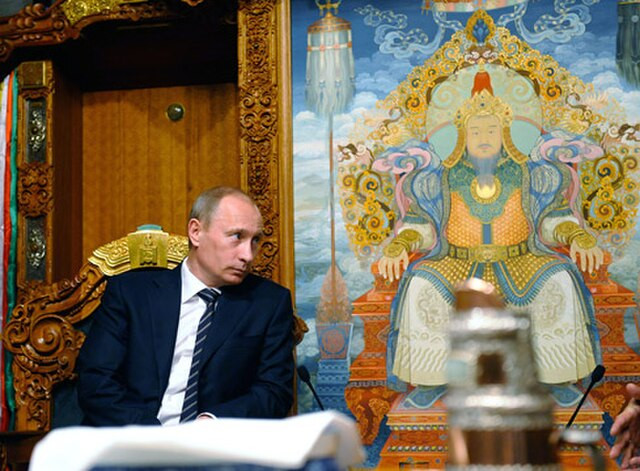Russian President Vladimir Putin's state visit to Mongolia has stirred significant controversy, as the host nation has opted to overlook an International Criminal Court (ICC) arrest warrant for the Russian leader. The warrant, issued last year, accuses Putin of war crimes related to the deportation of Ukrainian children, placing Mongolia in a precarious position diplomatically and legally.
Upon arriving in Ulaanbaatar, the Mongolian capital, Putin was met with a grand reception. He stepped out of his limousine to a ceremonial welcome featuring guards in traditional attire, reminiscent of the Mongol Empire's historic military regalia. Mongolian President Ukhnaagiin Khurelsukh greeted him warmly, and Putin engaged in symbolic gestures such as kissing a young girl who presented him with flowers.
The ICC's arrest warrant requires its 124 member states, including Mongolia, to detain Putin if he enters their territory. However, Mongolia has not acted on this obligation. Ukrainian Foreign Ministry spokesperson Heorhiy Tykhyi criticized Mongolia's inaction, calling it a "heavy blow to the International Criminal Court and the system of criminal law." He added that Ukraine would seek to ensure Mongolia faces consequences for its decision.
Mongolia's decision has sparked broader international concern. The European Union expressed apprehension that Mongolia might not enforce the ICC warrant, a sentiment echoed by various human rights activists. Despite being an ICC member state, Mongolia's heavy economic and energy dependence on Russia complicates its stance. The country remains deeply intertwined with Russia and China, which influences its foreign policy decisions.
The Kremlin has downplayed concerns over the arrest warrant. Kremlin spokesman Dmitry Peskov indicated that Moscow had no apprehensions about the visit, underscoring that all aspects of Putin's trip had been discussed in advance with Mongolia. Peskov framed the visit as a testament to the "great dialogue" and "strategic partnership" between the two nations.
During his visit, Putin and Khurelsukh discussed various bilateral agreements aimed at enhancing trade and cooperation. Notably, the discussions included the Power of Siberia 2 pipeline project, which seeks to transport 50 billion cubic meters of natural gas annually from Russia's Yamal region to China. This pipeline is crucial for Russia's strategy to offset the loss of European gas sales due to the ongoing conflict in Ukraine.
In addition to the energy discussions, Putin's visit also covered infrastructure projects and potential upgrades to Mongolia's power sector. Agreements included feasibility studies for new power plants and environmental assessments for a proposed hydroelectric project. These developments reflect the deepening ties between Moscow and Ulaanbaatar amidst shifting geopolitical dynamics.
The visit occurred against the backdrop of ongoing conflict in Ukraine, where Russian forces continue to launch significant strikes. On the day of Putin's arrival, Russian military operations resulted in a devastating attack on a Ukrainian military training facility, killing at least 41 people. This attack underscores the persistent and grave nature of the conflict that has led to the ICC warrant.
Protests in Mongolia, although limited, reflected domestic discontent with the visit. Some demonstrators attempted to voice their opposition to Putin's presence and the perceived failure of Mongolia to uphold international legal obligations. However, these protests were swiftly suppressed by local authorities.
In historical context, Mongolia's decision aligns with a precedent of countries prioritizing strategic and economic interests over international judicial obligations. The visit underscores a broader trend where geopolitical and economic factors can overshadow international legal commitments.
Putin's trip to Mongolia, his first in five years, is part of a broader effort to counteract international isolation. His recent travels include visits to China, North Korea, and Vietnam, reflecting a concerted effort to bolster diplomatic ties and mitigate the impact of Western sanctions.




